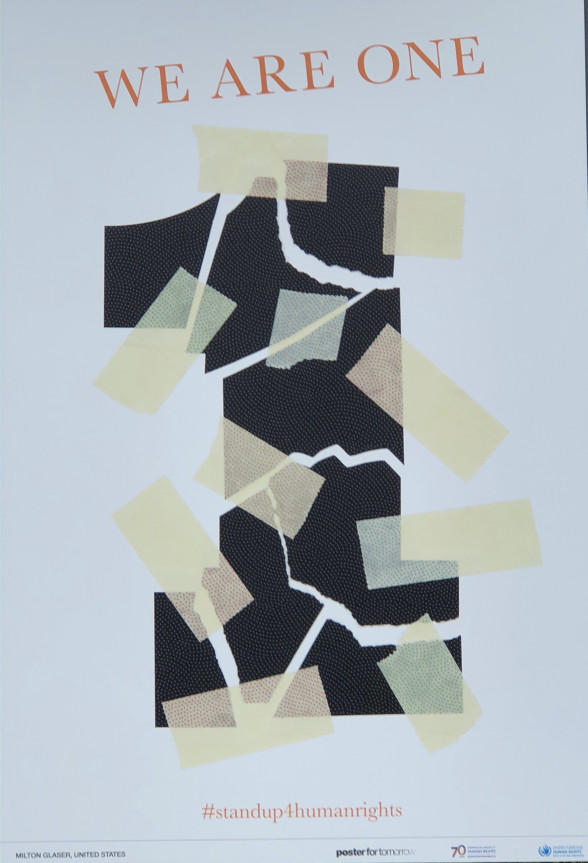To say it has been a busy and at times overwhelming or exciting week, is quite the understatement. Even DAI’s Back Up Brain (also my husband Peter Watt, and my B.U.B. as well) has been attending sessions on our behalf, as some I felt were of interest or benefit to DAI and our members were on at the same time I was at something else.
Peter is not a 'conference groupie' by nature and even dislikes the idea of institutionalised education, so taking notes, and attending some of these events, was probably not on his #BucketList (!!!), and I have no doubt he may have found many of them mildly boring and certainly very tedious for him... But he did it, for the rest of humanity!!! ;-)
The image above is from one of the signs walking into the Palais de Nations (United Nations), all focused on human rights. I think this one applies well to DAI, as we are one, especially when we work together as a TEAM. When we do that, our impact is much stronger, and our 2018 Board and Action group members this year are an incredible team.
I'm TRULY proud and honoured to walk beside them all, and work for, and stand beside all of our members.
But back to the 71st WHA....
In truth, some of the sessions I attended were not only a tad boring, they were repetitious, and often had the same speakers from a previous session, sometimes even giving exactly the same speeches.
For now what I am adding for Day 5 of the WHA, is one great quote, as it is very relevant to what we do at Dementia Alliance International, plus the exact speech from yesterday, and a video of interest.
After the session late yesterday, Human Rights in Global Health: Rights-Based Governance for a Gobalizing World, I wanted to share this quote from one of the presenters, lawyer Ms Alica Ely Yamin, who is the Program Director, Health and Human Rights Initiative, from the O'Neill Institute for National and Global Health Law, made during the Q&A ater the speakers:
"It is the people who are affected by an illness or condition who MUST TAKE THE POWER, not the Bureaucrats."
This is exactly what members of DAI have done, and the world is still getting used to it.
Hence, we will persist, we will continue to co-operate and collaborate and work together, and we will continue on until we make the change we not only want, but that we all have an absolute basic human right to.
It would take too long to write up the notes for all the sessions we attended Peter and I have attended between us, so I've simply added the exact speech I made yesterday, reduced to less than one minute as requested by the Chair, on Palliative care for all, including people with dementia. As mentioned in yesterdays blog, I was technically representing The World Palliative Care Alliance. This is what I said:
None of us in this room want to suffer* ourselves or see our friends and family suffer because of a lack of palliative care for conditions such as cancer, dementia, COPD and heart disease when cure is not possible. Palliative care is a fundamental part of Universal Health Coverage and the continuum of care for people living with non-communicable diseases. Take if from someone living with dementia, let’s make the cost effective essential package of palliative care available to those who need it.
*The use of the word suffer used in this speech, is not referring to the lied experince of dementia, but rather, to the suffering caused by the lack of access to palliative care.
I think many of you may also enjoy this video on my personal blog, based on a presentation I gave in Brisbane on May 10, 2018, also very relevant to the World Health Assembly this week!
Kate Swaffer, DAI Chair, CEO & Co-founder
